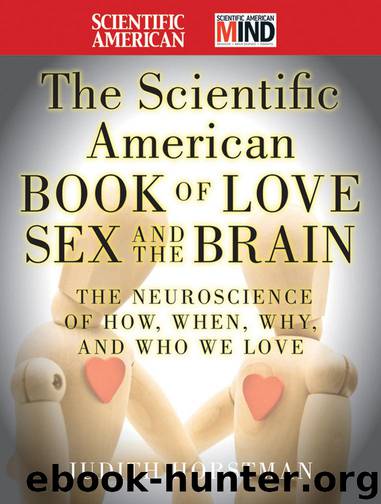The Scientific American Book of Love, Sex and the Brain by Judith Horstman

Author:Judith Horstman
Language: eng
Format: azw3, epub
Publisher: Jossey-Bass
Published: 2011-11-09T06:00:00+00:00
You’ve Got a Friend—or You Should!
The good effects of companionship are so profound that an active social life may be the next prescription from your doctor, who, in the not-too-distant future, may tell you to “find two more friends, and call me in the morning.”
It could be, as studies increasingly reveal, that having a wide range of social relationships improves longevity. More than a century’s worth of research shows that having a healthy social life is important to staying mentally and physically healthy. Overall, social support increases survival by some 50 percent, concluded the authors behind a new meta-analysis, Julianne Holt-Lunstad, Timothy Smith, and J. Bradley Layton. Therefore, a long lunch with coworkers, a night out with your same-sex friends, or a late-night conversation with a close family member might be just what the doctor ordered.
Sometimes we view these events as a distraction from other healthy habits, such as going to the gym or getting a good night’s sleep. Or we may regard them as poor substitutes for romantic relationships. But the benefit of friends, family, and even colleagues turns out to be just as good for long-term survival as giving up a fifteen-cigarette-a-day smoking habit. And by the study’s numbers, interpersonal social networks are more crucial to physical health than exercising or beating obesity. When they looked at studies that asked more detailed and nuanced questions, such as how involved a person is with many others, rather than just asking if a person is living with someone, researchers found that having real-life and complex social networks increased survival rates by 91 percent.
Friendship may also protect your aging brain. Several studies have connected an active social life with a lower risk of dementia, and a 2008 Harvard University study found that older folks with an active social life have a slower rate of memory decline. The study looked at data gathered from the Health and Retirement Study over the years between 1998 and 2004, beginning when all participants were over the age of fifty. Participants were given memory tests at four different times and were queried about their social and volunteer activities, marital status, and contact with relatives, neighbors, and friends. And voilà: those with the highest level of social interactions had the slowest rate of memory decline over the years—less than half the rate of those who were the least socially active. A Kaiser Permanente study in Southern California found similar results among 2,249 elderly women tested over the years. The women were all older than seventy-eight when the study began in 2001 and free of dementia. In the follow-up studies over the years, those with the larger and more active social networks had the lowest rate of dementia.
THE IDEAL CIRCLE OF FRIENDS
Your social circles may seem chaotic. But they actually form regular hierarchical structures—in the shape of concentric rings—according to evolutionary psychologist Robin Dunbar of the University of Liverpool in England.
Our very closest intimates form an innermost hoop of three or four, or at most five, people. We
Download
The Scientific American Book of Love, Sex and the Brain by Judith Horstman.epub
This site does not store any files on its server. We only index and link to content provided by other sites. Please contact the content providers to delete copyright contents if any and email us, we'll remove relevant links or contents immediately.
Periodization Training for Sports by Tudor Bompa(8254)
Why We Sleep: Unlocking the Power of Sleep and Dreams by Matthew Walker(6706)
Paper Towns by Green John(5179)
The Immortal Life of Henrietta Lacks by Rebecca Skloot(4581)
The Sports Rules Book by Human Kinetics(4379)
Dynamic Alignment Through Imagery by Eric Franklin(4208)
ACSM's Complete Guide to Fitness & Health by ACSM(4057)
Kaplan MCAT Organic Chemistry Review: Created for MCAT 2015 (Kaplan Test Prep) by Kaplan(4009)
Introduction to Kinesiology by Shirl J. Hoffman(3766)
Livewired by David Eagleman(3765)
The Death of the Heart by Elizabeth Bowen(3611)
The River of Consciousness by Oliver Sacks(3599)
Alchemy and Alchemists by C. J. S. Thompson(3516)
Bad Pharma by Ben Goldacre(3422)
Descartes' Error by Antonio Damasio(3271)
The Emperor of All Maladies: A Biography of Cancer by Siddhartha Mukherjee(3155)
The Gene: An Intimate History by Siddhartha Mukherjee(3095)
The Fate of Rome: Climate, Disease, and the End of an Empire (The Princeton History of the Ancient World) by Kyle Harper(3057)
Kaplan MCAT Behavioral Sciences Review: Created for MCAT 2015 (Kaplan Test Prep) by Kaplan(2985)
